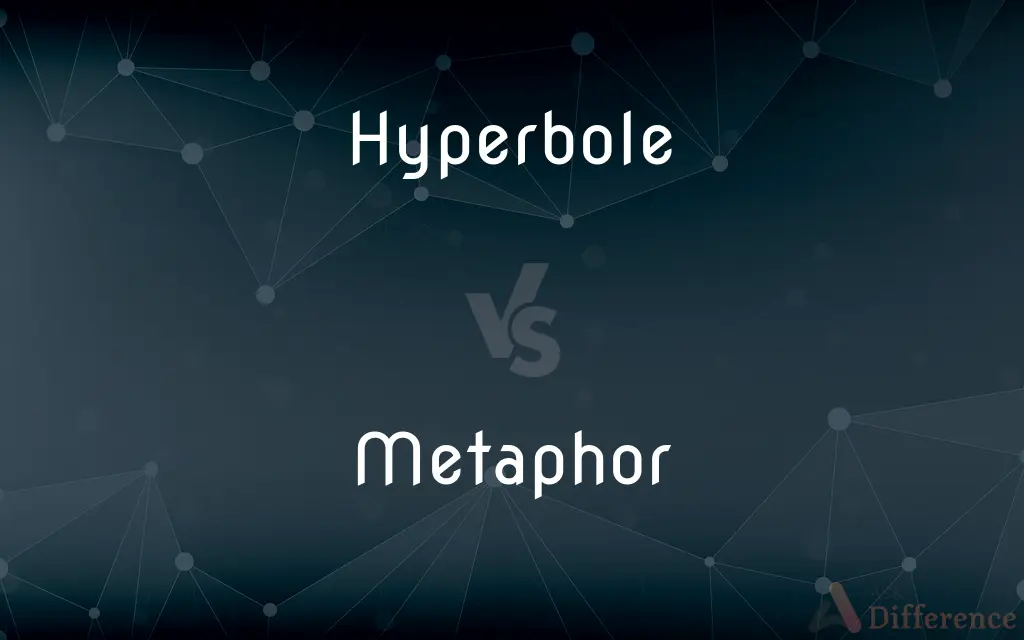Hyperbole vs. Metaphor — What's the Difference?
By Fiza Rafique & Urooj Arif — Updated on March 6, 2024
Hyperbole exaggerates for effect, while metaphor compares two unlike things by stating one is the other.

Difference Between Hyperbole and Metaphor
Table of Contents
ADVERTISEMENT
Key Differences
Hyperbole is a figure of speech that uses extreme exaggeration to make a point or show emphasis. It is not meant to be taken literally but is used to create a strong impression. For example, saying "I'm so hungry I could eat a horse" does not mean the person would actually eat a horse, but rather that they are very hungry. Whereas a metaphor directly compares two unrelated subjects without using "like" or "as," suggesting that one thing is another to highlight something they have in common. An example of a metaphor is saying "time is a thief" to imply that time, like a thief, steals moments from us.
Hyperbole often deals with emotions, emphasizing feelings or actions to a dramatic or exaggerated extent, which can add humor or intensity to the expression. It is commonly used in everyday speech, literature, and advertising for effect. On the other hand, metaphors serve to create more nuanced and insightful connections between concepts, offering a deeper understanding or a new perspective on the subjects being compared.
While hyperboles are generally easy to identify due to their exaggerated nature, metaphors require a bit more thought to unravel, as they involve recognizing the abstract similarities between two distinct concepts. Metaphors are a key tool in literary devices, providing rich imagery and layers of meaning to text.
Hyperbole can sometimes risk overstating or oversimplifying a situation, potentially leading to misunderstanding if the audience takes the exaggeration literally. Metaphors, however, risk being too obscure or complex, which can confuse readers if the underlying comparison is not clear or well understood.
The use of hyperbole and metaphor can greatly vary based on context, audience, and purpose. Hyperbole is best employed when aiming for a strong, immediate emotional reaction or emphasis, while metaphors are ideal for conveying complex ideas, relationships, or emotions in a more subtle and profound manner.
ADVERTISEMENT
Comparison Chart
Definition
An exaggerated statement not meant to be taken literally.
A figure of speech that directly compares two unlike things by saying one is the other.
Purpose
To emphasize or create a strong impression.
To reveal deeper similarities or insights.
Usage
Emotional exaggeration, humor, intensity.
Insight, depth, conceptual understanding.
Identification
Easily identifiable through exaggeration.
Requires interpretation of implicit connections.
Risk
Misinterpretation if taken literally.
Confusion if the comparison is too obscure.
Compare with Definitions
Hyperbole
Everyday speech, literature.
He ran faster than the wind.
Metaphor
Reveals underlying similarities.
His heart is a cold iron.
Hyperbole
Not meant to be taken literally.
I'm dying of laughter.
Metaphor
Offers nuanced understanding.
Her voice is music to my ears.
Hyperbole
Exaggeration.
This bag weighs a ton.
Metaphor
Used for imagery and depth.
Time is a thief.
Hyperbole
Emphasizes a point or feeling.
I've told you a million times.
Metaphor
Requires thought to understand.
The world is a stage.
Hyperbole
Creates humor or dramatic effect.
I could sleep for a year.
Metaphor
Compares two unlike things directly.
Life is a journey.
Hyperbole
Hyperbole (, listen) (adjective form hyperbolic, listen) is the use of exaggeration as a rhetorical device or figure of speech. In rhetoric, it is also sometimes known as auxesis (literally 'growth').
Metaphor
A metaphor is a figure of speech that, for rhetorical effect, directly refers to one thing by mentioning another. It may provide (or obscure) clarity or identify hidden similarities between two different ideas.
Hyperbole
Exaggerated statements or claims not meant to be taken literally
He vowed revenge with oaths and hyperboles
You can't accuse us of hyperbole
Metaphor
A figure of speech in which a word or phrase is applied to an object or action to which it is not literally applicable
Her poetry depends on suggestion and metaphor
When we speak of gene maps and gene mapping, we use a cartographic metaphor
Hyperbole
A figure of speech in which exaggeration is used for emphasis or effect, as in I could sleep for a year or This book weighs a ton.
Metaphor
A figure of speech in which a word or phrase that ordinarily designates one thing is used to designate another, thus making an implicit comparison, as in "a sea of troubles" or "All the world's a stage" (Shakespeare).
Hyperbole
A figure of speech in which the expression is an evident exaggeration of the meaning intended to be conveyed, or by which things are represented as much greater or less, better or worse, than they really are; a statement exaggerated fancifully, through excitement, or for effect.
Our common forms of compliment are almost all of them extravagant hyperboles.
Somebody has said of the boldest figure in rhetoric, the hyperbole, that it lies without deceiving.
Metaphor
A word or phrase used in such implied comparison.
Metaphor
The transference of the relation between one set of objects to another set for the purpose of brief explanation; a compressed simile; e. g., the ship plows the sea.
Metaphor
A figure of speech in which an expression is used to refer to something that it does not literally denote in order to suggest a similarity
Common Curiosities
Can hyperboles be used in formal writing?
While typically found in creative or expressive writing, hyperboles can be used in formal writing if done sparingly and with clear purpose.
Are metaphors always easy to understand?
Metaphors can vary in clarity; some may be easily understood, while others require more thought to decipher their deeper meaning.
How do hyperboles affect communication?
Hyperboles can enhance communication by adding emphasis or humor, but they may also lead to misunderstandings if taken literally.
What's the difference between a metaphor and a simile?
A metaphor directly states one thing is another, while a simile uses "like" or "as" to compare things.
Can a metaphor be a hyperbole?
Metaphors can incorporate hyperbolic elements to emphasize their comparisons, blending both figures of speech.
Why are metaphors important in literature?
Metaphors enrich text by adding depth, complexity, and vivid imagery, enhancing the reader's understanding and engagement.
How does context affect the interpretation of hyperboles and metaphors?
The context can significantly influence how hyperboles and metaphors are understood, depending on cultural, situational, and individual factors.
What is hyperbole?
Hyperbole is an exaggerated statement used for emphasis or humorous effect, not meant to be taken literally.
What is a metaphor?
A metaphor is a figure of speech that directly compares two unlike things, suggesting that one thing is another, to highlight something they have in common.
Can metaphors change over time?
Yes, the meanings or interpretations of metaphors can evolve with language and culture.
How do you identify a hyperbole?
Look for statements that are clearly exaggerated beyond reality and not meant to be taken literally.
What makes a good metaphor?
A good metaphor is insightful, illuminating an unexpected similarity between two things in a clear and imaginative way.
What role do hyperboles play in humor?
Hyperboles can greatly enhance humor by exaggerating situations or characteristics to a ludicrous extent.
Is it possible to overuse metaphors?
Overusing metaphors can make writing confusing or overly complex, detracting from clarity.
Can hyperboles be negative?
Yes, hyperboles can be used to emphasize negative aspects or feelings as well.
Share Your Discovery

Previous Comparison
Vampire vs. Werewolf
Next Comparison
Lutheranism vs. CalvinismAuthor Spotlight
Written by
Fiza RafiqueFiza Rafique is a skilled content writer at AskDifference.com, where she meticulously refines and enhances written pieces. Drawing from her vast editorial expertise, Fiza ensures clarity, accuracy, and precision in every article. Passionate about language, she continually seeks to elevate the quality of content for readers worldwide.
Co-written by
Urooj ArifUrooj is a skilled content writer at Ask Difference, known for her exceptional ability to simplify complex topics into engaging and informative content. With a passion for research and a flair for clear, concise writing, she consistently delivers articles that resonate with our diverse audience.














































